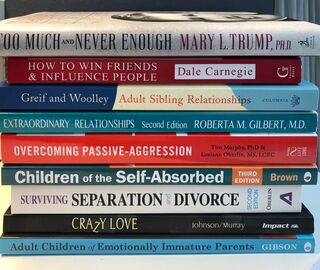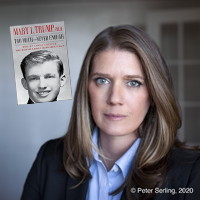President Donald Trump
What Mary Trump Reveals May Spark Your Own Family Journey
Family of origin installs buttons no one is destined to keep.
Posted July 14, 2020
My first look at Too Much and Never Enough1 appears in “Psychological Concepts in Mary Trump’s Memoir.”2

Part 2 shows how spot-on her title describes a family split along gender lines, with torment that didn’t appear to be course-corrected nor admonished. She begins with a 2017 White House dinner for two aunts, where one of them regaled family, amusing all but the member who sat, arms crossed.
At 14, Freddy, her late father, was ridiculed incessantly. When “Donald’s needling became too much, and in a moment that would become family legend, Freddy picked up the first thing at hand that wouldn’t cause any real damage: the bowl of mashed potatoes,” dumping it on his 7-year-old brother.
Mary stands up for Fred Jr., who died at age 42 of a heart attack following alcoholism, and candidly reveals the expected obedience, conditional love, and tolls taken.
“Fred was simultaneously telling his [eldest] son that he had to be an unqualified success and that he never could be,” she writes. “From his first day on the job, my 22-year-old uncle was given more respect, perks, and paid more money than my father.”
The career genogram: Fred expected Freddy to enter the business, begun by Elizabeth after Friedrich Trump died of the 1918 Spanish flu, a medical genogram or nodal event.3
Freddy put aside interest in flying planes, or in being a “bus driver in the sky,” as Fred mocked, to appease, in what ended up as dangled opportunities and being second-guessed. In a very public humiliation, his father shouted: “Donald is worth ten of you.”

Freddy left. As a commercial airline pilot, he earned his own living, achieved respect, and felt in control. The price he paid for differentiating himself, however, was steep.
The less developed a person’s self, the more impact others have, relying upon acceptance and approval of others, quickly adjusting what they say or do to please people. Or, some may bully others to conform to pressure or groupthink.4
Differentiation of self refers to an individual’s ability to think and act rationally within any system, and ideally, to maintain ties within it. Higher levels relate to greater individual autonomy.5 Open groups have more capacity for this than closed systems.
“The only self-made man in the family, Freddy was being slowly, inexorably dismantled.” Dr. Trump writes it was to put him in his place and signal Donald as heir apparent. As Freddy disengaged from the drama, he numbed the pain with alcohol. Disengagement (little connection with family) is the opposite of enmeshment where members seem to be velcroed together.6
In Too Much and Never Enough, Mary Trump, who uncles call “honeybunch,” holds astonishment in check as mixed messages play out. When electronics needed to complete her degree were stolen, she called the family attorney/trustee for an advance (by mere weeks) on her allowance. Her grandfather’s message: “Get a job.”
Incongruent or mixed messages abound when people claim they feel or believe one thing and then act in an altogether different manner. Manipulative phrases that push guilt buttons, buttons passive-aggressors often install, leave people feeling uncomfortable.7
Incidents like this galled Mary, who worked to procure an education and livelihood while an aunt received a judicial appointment from a called-in favor. “Donald thought it might be useful to have a close relative on the bench in a state in which he planned to do a lot of business,” she writes. “He would do with casinos what Fred had done with his apartment buildings.”
Her uncle refused to learn that running New Jersey casinos was vastly different from Brooklyn rental properties. As loan defaults and bankruptcies loomed, his image, the brand, was at stake, she writes. “My grandfather sent his chauffeur with more than $3 million in cash to purchase chips … with no intention of gambling … the next day, he wired another $150,000.” Fred enabled and got fined by the gaming commission.
Enabling means to fix, solve, or make consequences for actions or ineptitude go away. Fred Trump accumulated no debt, but doubled down to save a fantasy, refusing to see reality. Dr. Trump writes, “Now [Donald] belonged to the banks and the media. He was both enabled by and dependent upon them, just as he had been upon Fred.”
Younger generations can change dynamics. Mary and brother Fritz refused to sign documents pushed at them to quickly settle her grandfather’s estate. They had questions most would ask.

Before answers got delivered, medical insurance she and her brother had since birth got upended instead. This had no benefit but to create a double bind, two undesirable actions, for their unwillingness to grasp groupthink.
Fritz’s third child William, just out of neonatal intensive care, would be cut off when he was still medically fragile. They had to sue for reinstatement of the insurance.
Many families tangle in reactivity when stepping back to be thoughtful, empathic, less pressured, or perfect serves them well. Good enough is fine. Best to avoid being the angry, troubled, frantic, or indulged family.8
Readers may see similar patterns in family histories that this book inspires them to explore. Eyes wide open, acknowledging mistakes and course correcting indicates mature strength as often as individuation and following one’s passion provides fulfillment.
Final takeaway: Deep, polarized divisions aren’t mended by state, national houses, or elected officials. Through one’s own differentiation and independent choices, they’re remedied in everyone’s own house.
Copyright @ 2020 by Loriann Oberlin. All rights reserved.
Part 1: “Psychological Concepts in Mary Trump’s Memoir”
See also: Mary Trump and The Reckoning
References
1. M. L. Trump, Too Much and Never Enough: How My Family Created the World’s Most Dangerous Man (New York: Simon & Schuster, 2020). https://tinyurl.com/Mary-Trump-Book
2. “Psychological Concepts in Mary Trump’s Memoir” https://tinyurl.com/Mary-Trump-Memoir
3. R. Gilbert, Extraordinary Relationships, Second Edition (Stephens City, VA: Leading Systems Press, 2017).
5. G.L. Greif and M.E. Woolley, Adult Sibling Relationships (New York: Columbia University Press, 2016)
6. G.L. Greif and M.E. Woolley, Adult Sibling Relationships (New York: Columbia University Press, 2016)
7. T. Murphy and L. Oberlin, Overcoming Passive-Aggression: How to Stop Hidden Anger from Spoiling Your Relationships, Career and Happiness (Boston: DaCapo Press, 2016). https://tinyurl.com/Overcoming-Passive-Aggression
8. T. Murphy and L. Oberlin, Overcoming Passive-Aggression: How to Stop Hidden Anger from Spoiling Your Relationships, Career and Happiness (Boston: DaCapo Press, 2016). https://tinyurl.com/Overcoming-Passive-Aggression




